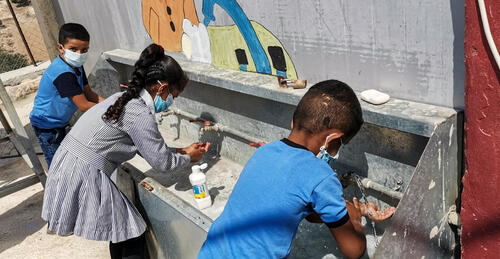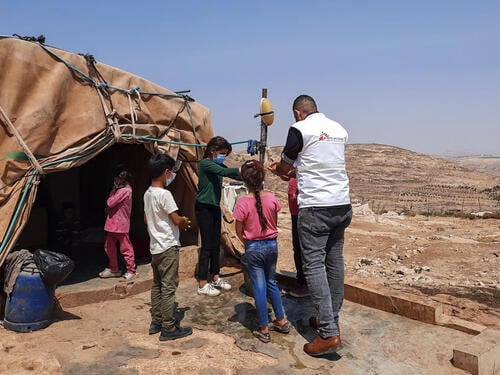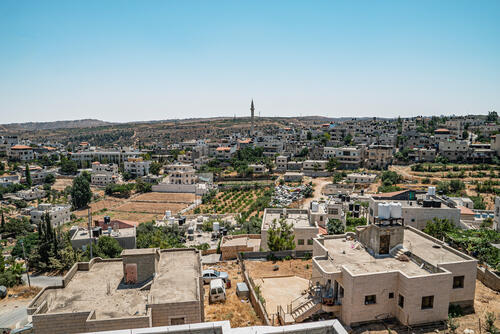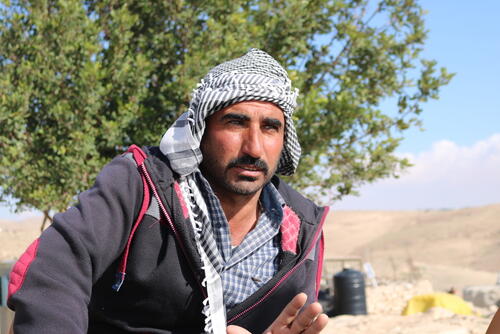Palestine is experiencing a spike in COVID-19 cases, both in the West Bank and the Gaza Strip. Of the more than 43,000 cases confirmed in the West Bank since the start of the pandemic, more than a third have been in Hebron governorate.As of 20 September, there were 43,088 cases in the West Bank with 15,789 of those in Hebron governorate. Since August 2020, Médecins Sans Frontières (MSF) has been supporting local health authorities there in tackling the virus.
“Hebron has been the epicentre of the outbreak in Palestine for a few months already,” says Katharina Lange, MSF project coordinator. “COVID-19 is a new disease and requires special attention, especially in places where people’s access to healthcare is already limited.”
“MSF has built up experience responding to disease outbreaks over recent decades, and to COVID-19 specifically over recent months,” says Lange. “We’ve been working in Hebron for over 20 years, so it made sense to support the health system here in facing this new challenge.”
MSF’s response in Hebron focuses on supporting the local health system with infection prevention and control and providing technical support to the intensive care unit in Dura hospital, one of the main hospitals treating COVID-19 patients in the city. More than 550 patients have been admitted since its COVID-19 ward opened in early July. Dura hospital is currently scaling up its capacity to 80 beds for COVID-19 patients, including eight intensive care beds with ventilators. In September, we also started providing technical support to Hebron’s Alia hospital, which also admits patients with COVID-19.

“Patients with COVID-19 can deteriorate rapidly and go from a severe to a critical stage,” says Helen Ottens-Patterson, MSF medical advisor in Hebron. “In this situation they need intensive care support with adapted oxygen therapy.”
Of the 300 deaths reported in Palestine since the start of the pandemic, almost half (141) were in HebronAs of 20 September (Source: WHO).
“Even if our team and our response is relatively small at this stage, we hope that MSF’s know-how and support will help reduce the worrying mortality rate of COVID-19 patients,” says Ottens-Patterson.
MSF has sent medics specialising in infection prevention and control and intensive care to both Dura hospital and Alia hospital. They are providing hands-on training to hospital staff on personal protective equipment, infectious waste, cleaning processes, oxygen therapy and bedside training.
“There has been a great deal of openness and positive feedback from the hospital teams,” says Ottens-Patterson. “This sense of collaboration is really motivating.”
However, providing treatment for patients already infected with COVID-19 is not enough to slow the curve.
“We also need to support prevention efforts, so that people don’t get infected in the first place,” says Lange.
People should know how to protect themselves and their relatives properly before it’s too late and they get sick.Katharina Lange, MSF project coordinator in Hebron
MSF teams have been carrying out health promotion activities in the most affected neighbourhoods in Hebron, and distributing hygiene kits and reusable face masks to people who are self-isolating and to first responders.
“People should know how to protect themselves and their relatives properly before it’s too late and they get sick,” says Lange.
MSF also plans to start health promotion activities in Dura and Alia hospitals. We have also stepped up our mental health activities in Hebron since the pandemic began. In March, MSF counsellors started supporting COVID-19 patients and their families as well as frontline health staff.
This is in addition to our long-term psychological support programme in Hebron, which started in 2001, and which is aimed at adults, teenagers and children who have been affected, directly or indirectly, by violence (for example the deaths of family members, severe injuries, home demolitions, detention and domestic violence). MSF psychosocial teams provide individual and group sessions and psychotherapy sessions across Hebron governorate.
“People’s mental health is just as important as their physical wellbeing, so we’re really trying to address the two in our COVID-19 response,” says Lange. “We’re currently in touch with other health facilities to further extend our support to those who need it.”
MSF in Palestine
In Gaza, MSF runs inpatient departments and clinics to treat patients with trauma and burns. We scaled up our activities in 2018 to care for thousands of people shot by the Israeli army during protests in the Great March of Return. We provide plastic surgery and orthopaedic surgery to close large wounds and to begin the process of repairing loss of and damage to the bone, as well as providing dressings, physiotherapy, health education and psychosocial support.
In the West Bank, we run mental healthcare programmes in Nablus, Qalqilya and Hebron, where the ongoing occupation, violence and socio-economic insecurity have taken a severe toll on residents.






